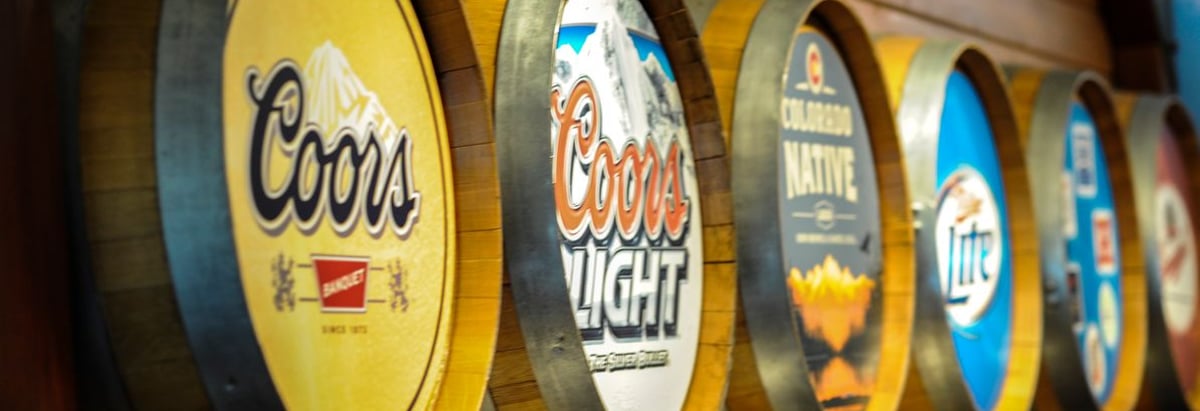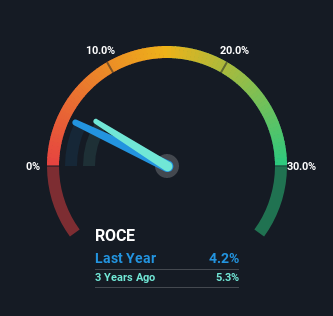- United States
- /
- Beverage
- /
- NYSE:TAP
Here's What's Concerning About Molson Coors Beverage's (NYSE:TAP) Returns On Capital

Ignoring the stock price of a company, what are the underlying trends that tell us a business is past the growth phase? A business that's potentially in decline often shows two trends, a return on capital employed (ROCE) that's declining, and a base of capital employed that's also declining. This reveals that the company isn't compounding shareholder wealth because returns are falling and its net asset base is shrinking. Having said that, after a brief look, Molson Coors Beverage (NYSE:TAP) we aren't filled with optimism, but let's investigate further.
Understanding Return On Capital Employed (ROCE)
If you haven't worked with ROCE before, it measures the 'return' (pre-tax profit) a company generates from capital employed in its business. Analysts use this formula to calculate it for Molson Coors Beverage:
Return on Capital Employed = Earnings Before Interest and Tax (EBIT) ÷ (Total Assets - Current Liabilities)
0.042 = US$980m ÷ (US$27b - US$3.6b) (Based on the trailing twelve months to September 2022).
So, Molson Coors Beverage has an ROCE of 4.2%. Ultimately, that's a low return and it under-performs the Beverage industry average of 14%.
Check out our latest analysis for Molson Coors Beverage

In the above chart we have measured Molson Coors Beverage's prior ROCE against its prior performance, but the future is arguably more important. If you're interested, you can view the analysts predictions in our free report on analyst forecasts for the company.
What Does the ROCE Trend For Molson Coors Beverage Tell Us?
In terms of Molson Coors Beverage's historical ROCE movements, the trend doesn't inspire confidence. Unfortunately the returns on capital have diminished from the 6.5% that they were earning five years ago. And on the capital employed front, the business is utilizing roughly the same amount of capital as it was back then. Since returns are falling and the business has the same amount of assets employed, this can suggest it's a mature business that hasn't had much growth in the last five years. So because these trends aren't typically conducive to creating a multi-bagger, we wouldn't hold our breath on Molson Coors Beverage becoming one if things continue as they have.
The Key Takeaway
In summary, it's unfortunate that Molson Coors Beverage is generating lower returns from the same amount of capital. Investors haven't taken kindly to these developments, since the stock has declined 34% from where it was five years ago. Unless there is a shift to a more positive trajectory in these metrics, we would look elsewhere.
If you'd like to know about the risks facing Molson Coors Beverage, we've discovered 2 warning signs that you should be aware of.
If you want to search for solid companies with great earnings, check out this free list of companies with good balance sheets and impressive returns on equity.
New: Manage All Your Stock Portfolios in One Place
We've created the ultimate portfolio companion for stock investors, and it's free.
• Connect an unlimited number of Portfolios and see your total in one currency
• Be alerted to new Warning Signs or Risks via email or mobile
• Track the Fair Value of your stocks
Have feedback on this article? Concerned about the content? Get in touch with us directly. Alternatively, email editorial-team (at) simplywallst.com.
This article by Simply Wall St is general in nature. We provide commentary based on historical data and analyst forecasts only using an unbiased methodology and our articles are not intended to be financial advice. It does not constitute a recommendation to buy or sell any stock, and does not take account of your objectives, or your financial situation. We aim to bring you long-term focused analysis driven by fundamental data. Note that our analysis may not factor in the latest price-sensitive company announcements or qualitative material. Simply Wall St has no position in any stocks mentioned.
About NYSE:TAP
Molson Coors Beverage
Manufactures, markets, and sells beer and other malt beverage products under various brands in the Americas, Europe, the Middle East, Africa, and the Asia Pacific.
Undervalued with solid track record and pays a dividend.

